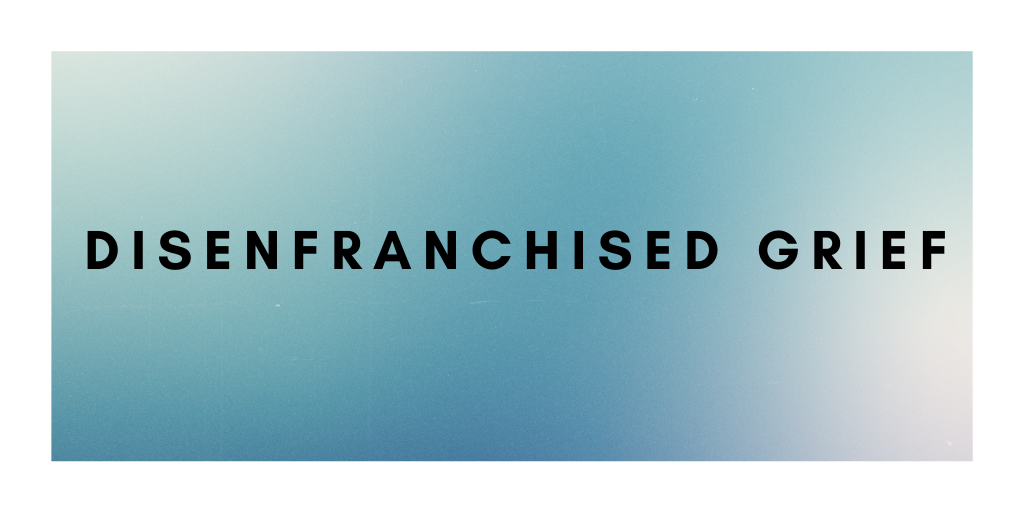Kenneth J. Doka Ph.D.
Editor’s Note: You can purchase Dr. Doka’s book “Disenfranchised Grief “Here!
Every society has external rules or norms that govern how we are expected to behave. Yet societies also have internal rules that set expectations on internal states—how we are expected to think, feel, and even believe. A subset of these rules direct our grief.
These grieving rules direct what losses we grieve, how we grieve them, who legitimately can grieve the loss, and how and to whom others respond with sympathy and support. These norms exist not only as folkways, or informally expected behaviors, but also in formal statements such as company policies that extend bereavement leave to certain individuals or regulations and laws that define who has control of the deceased’s body or funeral rituals.
In the United States and many other societies, these grieving rules limit grief to the deaths of family members. When a family member dies, one is allowed and expected to grieve, often in a specified way.
Yet humans exist in intimate networks that include both kin and non-kin. They harbor attachment to fellow humans, animals, and even to places and things. Persons experience a wide range of losses—deaths, separations, divorces, and other changes or transitions. When these attachments are severed, be it by death or any other separation, the individual, then, grieves such loss in characteristic ways. And, individuals may experience, express and adapt to loss in many ways, some outside of the grieving rules. In such situations, the personal experience of grief is discordant with the society’s grieving rules. The person experiences a loss, but others do not recognize that grief. That person has no socially accorded right to grieve that loss or to mourn it in that way.
In my work, I coined the term disenfranchised grief as “grief that persons experience when they incur a loss that is not or cannot be openly acknowledged, socially sanctioned or publicly mourned” (1989, p.4). In other words one has a loss but there is no right to grieve that loss.
Grief may be disenfranchised in a number of situations. First there may be relationships that are not recognized by others. Here the closeness of other non-kin relationships may simply not be understood or appreciated. The roles of lovers, friends, neighbors, foster parents, colleagues, in-laws, stepparents and stepchildren, caregivers, counselors, co-workers, and roommates (for example, in nursing homes) to name a few, may be long-lasting and intensely interactive, but even though these relationships are recognized, mourners may not have full opportunity to publicly grieve a loss. At most, they might be expected to support and assist family members.
Second, the loss is not socially defined as significant. Individuals experience many losses—some death related such as perinatal loss or other non-death related losses such as divorce, incarceration, the loss of a job or material possessions or significant change in others that may be unacknowledged by others. There are many other types of loss, all of which may be profound, but nonetheless may not be recognized or validated. Some may be intangible. For example, a teenager aspiring disability may experience a loss of dreams. Similarly, the loss of reputation, due to scandal, gossip or an arrest can be devastating. Even transitions in life can have undercurrents of loss. Aging, for example, leads to constant developmental losses such as the loss of childhood or other losses associated with different points of life.
Third, there are situations in which the characteristics of the bereaved in effect disenfranchise their grief. Here the person is not socially defined as capable of grief; therefore, there is little or no social recognition of his or her sense of loss or need to mourn. Despite evidence to the contrary, both the old and the very young are typically perceived by others as having little comprehension of, or reaction to the death of a significant other. Similarly, mentally disabled persons may also be disenfranchised in grief.
Then too, the nature of the death may constrain the solicitation of the bereaved for support as well as limit the support extended by others. For example, many survivors of a suicide loss often feel a sense of stigma, believing that others may negatively judge the family because of the suicide.
Finally, the way an individual grieves also can contribute to disenfranchisement. Certain cultural modes of expressing grief such as stoicism or wailing may fall beyond the grieving rules of a given society, and thus be disenfranchising.
Yet, while grief may be disenfranchised within the larger society, it is still grief. Disenfranchised grievers need what all grievers need—validation, support, empathy, and opportunity to engage in ritual. And counselors have a special role—to enfranchise the disenfranchised.

Leave a comment